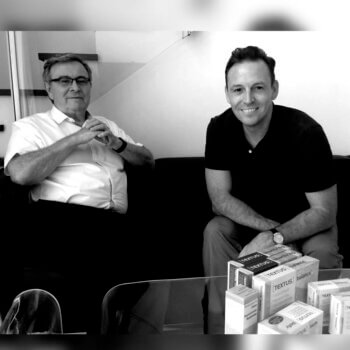Born and brought up in Delhi, Abhishek Maitreyi went to IIT Guwahati to study Biotechnology. After graduation, Abhishek started his career in the Analytics team at Flipkart, working with the Marketing function. Abhishek recalls his reporting manager then being a superb data scientist and while he couldn’t really pick up the tools and techniques before he left Flipkart, the kind of impact that leveraging data had left a strong impression on him.
After Flipkart, Abhishek joined 1mg. where he was supposed to join the Analytics team but ended up working as a Product Manager. This stint gave Abhishek a sense of what it really takes to build an amazing product, he was working on the content piece mostly and this was the first time he had to think about building rather than analyzing. Also, this being a newer company, helped Abhishek overcome his hesitancy or fears about starting up, which Abhishek decided to do once he left the company. He shares his story for CaRPM, the brainchild that resulted from the experiences he built from his career.
In your own words what is CaRPM?
CaRPM is an IoT startup in the automobile space. Our core belief is that leveraging data correctly can remove a lot of inefficiencies and help you make smarter decisions. CaRPM is an extension of those beliefs in the automobile domain. It taps into a car’s data and enables you to decide better by giving you insights about it’s health and performance, be it while driving a car or while buying one.
How did you come up with the idea of CaRPM?
Ankit, Lovish and I were all living in Delhi last year. We’ve been close friends since college and were looking at doing something of our own. We first toyed with the idea of doing something in the sports and fitness space but couldn’t see ourselves doing anything big there.
Lovish’s brother runs a Automobile parts and accessories business, he was the one who told us about OBDII and how there are scanners available in the market that allow you to read a car’s data. We got into research mode and a few months later launched CaRPM.
Could you walk us through the process of starting up CaRPM?
This is our first time starting up, and believe me, we had no idea of how anything worked when we started. We pooled our savings and moved into my place. Lovish and Ankit did the coding while I used to go out and talk to mechanics, dealerships, taxi guys, basically anyone who spent enough time in and around cars.
We initially wanted to build a marketplace of car mechanics along with the OBDII bit. But that turned out to be to extremely operationally heavy so we decided to focus on one thing and stopped that after a couple of months.
Did you encounter any particular difficulties during startup?
I guess all startups go through the same difficulties. Survival, seeking investment, aligning everyone to your vision, convincing the early customers. These are problems that each startup goes through and it’s important to have a strong, supportive team with you to help through the rough patches.
How have you been developing CaRPM since startup?
We had started with an idea of building a B2C product, but gradually evolved into a connected car platform that offers solutions to multiple industries by leveraging OBDII and other forms of technology.
What kind of feedback have you gotten on CaRPM so far?
It’s been very encouraging. People and companies have really opened up to the idea of using this technology to save money. Their inputs have been super helpful in molding our product.
What is your strategy against your competition?
This is competitive like any other space. There are smart people building cool things, but competition is actually good. It keeps you on your toes. While we do keep an eye on what’s happening in the industry around us, we are much more concerned about ourselves and are focused on our growth than what any one else might be doing.
What can you tell us about the industry?
While we are getting fancier cars, the auto industry is typically one of the slower moving industries. Building something as complicated as a car, which nowadays is turning into a computer on wheels does take time. But more than the manufacturing process, it’s the aftermarket and the resale industry that’s operating in an archaic fashion. The way we currently buy and sell used cars is broken, there is no visibility into how the car is actually going to run. Rather than focusing on dents and scratches, we should be looking at future cost of car ownership. How much am I expected to spend on fuel for this car? How much on maintenance, how likely is it to break down? These are the questions we should be answering to assess the true value of the asset and increase trust in buyers.
What is the future of the industry?
The industry is growing rapidly. The ratio of new to used cars sold annually is 1:1.4 currently. It’ll be 1:3 by 2020. On the connected cars front, you can see OEMs such as Honda entering the space themselves. This tells you how much emphasis everyone in the automobile industry is placing on keeping up with new technology and it’s only a matter of time before we start seeing data from cars altering the way we interact with them, be it while driving, buying, selling or renting.
Same as any other industry, you have to keep innovating constantly to stay relevant. Since this is a rather novel concept in India, we have an opportunity to make our mark here and if we are able to do well, we just might be able to change the way things are done.
Were there anything that disappointed you initially?
Not really. People have generally been quite helpful and since this was our first time starting up, we accepted most things as part of our learning curve.
What do you think about being an entrepreneur in Asia?
It can be both. It’s harder because despite startups cropping up left, right and center nowadays, entrepreneurship still isn’t as common as the West and the ecosystem is still developing. There is still a huge need for good mentors here.
It’s also easier because you have a rather large market waiting to be tapped. There are a lot of folks around our age starting up so that definitely helps as well.
What is your opinion on Asian entrepreneurship vs Western entrepreneurship?
What is your definition of success?
Although your idea of what you want to achieve may keep evolving over time, if you manage to achieve your goals, if you change the way to do a particular thing for the better, then you are doing it right.
Why did you decide to become an entrepreneur?
I was enamoured by the chance to have a shot at solving a large problem and found like-minded people at the right time.
In your opinion, what are the keys to entrepreneurial success?
Perseverance, perseverance, perseverance.
Any parting words of wisdom for entrepreneurs out there from your personal experience?
I am hardly qualified to answer this, but would just want to reiterate what more experienced and smarter folks have emphasized upon- Always try to get people who are smarter than you on your side of the table.
Connect
Facebook: https://www.facebook.com/abhishek.maitreyi
LinkedIn: https://in.linkedin.com/in/abhishek-maitreyi-a8b48a9b
Website: www.carpm.in






























